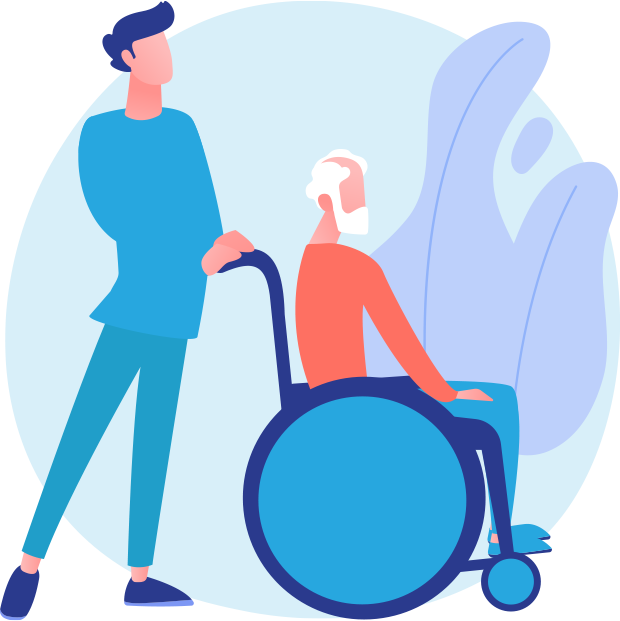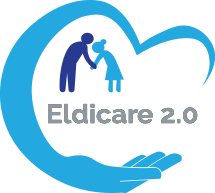
The project
Eldicare 2.0 is the continuation of the Sector Skills Alliance project “Eldicare: Matching Skills in a growing European Silver Economy”, which has been implemented from 2018 to 2021, also coordinated by AKMI S.A. Eldicare had a great impact for the elderly care sector, however the COVID-19 outbreak affected both the project activities and the elderly care sector. Thus, a new synergy, focused on the post-COVID era and the EC goals related to digitalization, green transition, entrepreneurial and soft skills of caregivers was decided to be developed.
In particular, more than the one fifth of the EU population in 2021, was over 65 years old. The higher life expectancy rates along with the low birth rates in Europe, are contributing to a change in the shape of the EU’s age pyramid. As EU population is growing older constantly, gradually more and more people become frail and dependent on affordable, preventive and curative long-term care. However, the pandemic’s disproportionate impact on older people – in terms of hospitalisations and deaths – has highlighted some of the challenges an ageing population poses on health and social care, proving that the long-term care sector was generally ill-prepared to tackle a health emergency of such dimension, as COVID-19.
Objectives
Develop a long-term skills strategy for elderly care professionals, by creating a Skills Ecosystem for Elderly Care workforce.
Upskill and reskill the elderly care professionals, to be able to meet the growing needs of the ageing population.
Upgrade the existing and emerging Occupational Profiles with up-to-date and essential skills for the elderly care practitioners, by focusing on the principles of digital and green economy, the entrepreneurship and a patient-centred care.
Bridge the skills gaps of elderly care professionals, by analysing the skills mismatches at post COVID era, in order to ensure a common basis for the competences.
Establish a methodology for addressing future skills needs, by creating a skills anticipation mechanism and developing policy recommendations.
Provide new teaching and learning approaches, by creating competence-based courses, work-based learning procedures, employers’ handbook, with the use of micro credentials and the MOOC platform.
Bring together education actors (VET providers, HEIs) with market representatives and umbrella organizations, by mobilizing and incentivising them to take action, in order to achieve a systemic and structural impact.
Raise the quality and the attractiveness of training in the health care sector at a European, National, Regional and Local Level, by developing a common perception among the key stakeholders.
Expected results
Eldicare 2.0 is going to produce the following results, during the project’s lifespan:
- Blueprint Report on the future Elderly Care Providers
- Set of new/updated Occupational Profiles
- Finalized Training Material
- F2F and online trainings conducted
- MOOC Platform
- National and EU Policy Recommendations Paper
- A turnkey for third countries

Project Activities
- Project Initiation: Legal and administrative setup, including Grant and Bilateral Agreements, to ensure a timely project start.
- Team Formation: Establishment of a multi-level governance structure for effective coordination and oversight.
- Communication Setup: Launch of the Project Handbook, Basecamp platform, and internal communication procedures.
- Monitoring & Reporting: Continuous reporting, secure file storage, and submission of the Final Project Report.
- QA Mechanism Setup: Creation of a comprehensive QA Plan with indicators, risk strategies, and tools; establishment of a Quality Assurance Board (QAB).
- Monitoring & Reporting: Continuous quality monitoring via tools and semi-annual reports, with regular risk reviews and timeline checks.
- External Evaluation: Independent evaluator selected to deliver mid-term and final reports and provide ongoing feedback on project progress.
- Post-Covid Impact Assessment to the elderly care sector’s skills needs (with emphasis on digital and soft skills
- Assessment of skill mismatches and upskilling and re-skilling needs of the workforce in the elderly care sector (with emphasis on green and entrepreneurial skills)
- Visioning the TO-BE Working Environment of Elderly Care Organizations
- Identification of existing Occupational Profiles in the elderly care sector that should be updated
- Drafting of the updated sets of Occupational Profiles
- Drafting Training Curricula for Re/ Upskilling elderly care professionals
- Adaptation of Curricula to country specific context
- Preparation of the Digital certification of elderly care practitioners with the use of Micro credentials
- Preparation of MOOC platform
- International Accreditation of the Curriculum
- Preparation of the Pilot Implementation Phase of the Trainings
- Piloting the Developed Curricula
- Evaluation and fine-tuning of Curricula
- Skills Anticipation Mechanism for the monitoring of future skills needs in the elderly care sector
- Policy Recommendations to strengthen re/upskilling of the elderly care workforce
- Eldicare 2.0 turnkey solution for third countries
- Dissemination Strategy & Materials: Develop a detailed plan with visual identity, tools, timelines, and impact indicators, supported by promo videos, leaflets, and banners.
- Stakeholder Engagement: Build a 2000+ stakeholder network via meetings, events, and EU roundtables to boost participation and impact.
- Digital Outreach: Ensure EU-wide visibility through social media, newsletters, press releases, and EVSW online events.
- Project Capitalization: Collect trainee testimonials and host a high-level final conference in Brussels to showcase results and support sustainability.

News & Events

